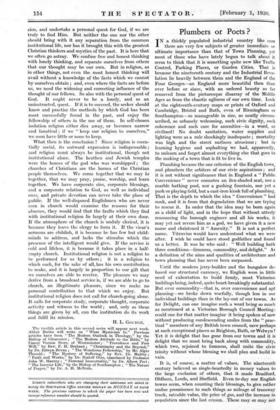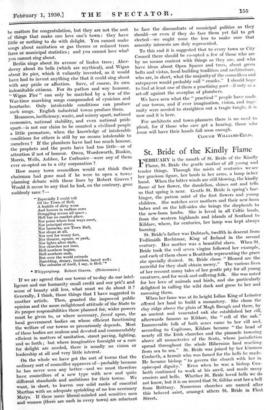Plumbers or Poets ?
TN a thickly populated industrial country like ours -I- there are very few subjects of greater immediate or ultimate importance than that of Town Planning, yet most of those who have lately begun to talk about it seem to think that it is something quite new like Traffic Control, Parking Places, or Garden Cities. That is because the nineteenth century and the Industrial Revo- lution lie heavily between them and the England of the Four Georges—an England more beautiful then than ever before or since, with an ordered beauty as far removed from the picturesque disarray of the 'Middle Ages as from the chaotic ugliness of our own time. Look at the eighteenth-century maps or prints of Oxford and Cambridge, Bristol and Bath, even of Birmingham or Southampton—so manageable in size, so neatly circum- scribed, so urbanely welcoming, such civic dignity, such coherence and such care for amenities—in a word, so civilized! No doubt sanitation, water supplies and lighting were as a rule shockingly inadequate ; Mortality was high and the street surfaces :atrocious ; but in learning hygiene and asphalting we had, apparently, to unlearn and forget almost everything else that goes to the making of a town that is fit to live in. - Plumbing became the one criterion of the English town, and plumbers the arbiters of our civic aspirations ; and it is not without significance that in England a " Public Convenience " never connotes an ilex-shaded seat, nor a marble bathing pool, nor a gushing fountain, nor yet a park or playing field, but a cast-iron kiosk full of plumbing. That is the depth to which the idea " Convenience " had sunk, and it is from that degradation that we are trying to rescue it. In order that the idea may be born again as a child of light, and in the hope that without utterly renouncing the borough engineer and all his works, it may yet not revere him as a god, we have given it a new name and christened it " Amenity." It is not a perfect name. Vitruvius would have understood what we were after. I wish he could have stood godfather and found us a better. It was he who said : " Well building hath three conditions—firmness, commodity, and delight." As a definition of the aims and qualities of architecture and town planning that has never been surpassed.
Until the modern jerry-builder and the bungalow de- based our structural currency, we English were in little need of exhortation to build _firmly, most Victorian buildings being, indeed, quite heart-breakingly substantial. But over commodity—that is, over convenience and apt planning—we broke down woefully, though less in our individual buildings than in the lay-out of our towns. As for Delight, can one imagine such a word being so much as mentioned at a Victorian Borough Council Meeting: could one for that matter imagine it being spoken of now without producing condescending smiles from the " prac- tical " members of any British town council, save perhaps at such exceptional places as Brighton, Bath, or Welwyn ? ;Yet it is delight that has gone from our towns and it is delight that we must bring back along with commodity, which two, rejoined to firmness, shall unite the civic trinity without whose blessing we shall plan and build in vain.
It is, of course, a matter of values. The nineteenth century believed so single-heartedly in money values to the large exclusion of others, that it made Bradford, Oldham, Leeds, and Sheffield. Even to-day our English towns seem, when counting their blessings, to give rather undue prominence to such things as mileage of tramway track, rateable value, the price of gas, and the increase in population since the last census, These may or may not be matters for congratulation, but they are not the sort of things that make one love one's town : they have little or nothing to do with delight. You cannot make songs about sanitation or gas therms or reduced tram fares or municipal statistics ; and you cannot love what you cannot sing about.
Berlin sings about its avenue of linden trees ; Aber- dovey about its bells (which are mythical), and Wigan about its pier, which it valiantly invented, as it would have had to invent anything else that it could sing about with any pride or affection. Save, of course, its own indomitable citizens. For its pathos and wry humour, "Wigan Pier " can only be matched by a few of the War-time marching songs compounded of cynicism and heartache. Only intolerable conditions can produce such songs. English industrial towns produce them.
Meanness, inefficiency, waste, and misery apart, national economics, national stability, and even national pride apart—is not our claim to be counted a civilized people a little premature, when the knowledge of intolerable conditions for others is still by no means intolerable to ourselves ? If the plumbers have had too much honour, the prophets and the poets have had too little—or of attention if not of honour. Owen, Wordsworth, Ruskin, Morris, Wells, Ashbee, Le Corbusier—were any of them ever co-opted on to a city corporation ?
How many town councillors would not think their chairman had gone mad if he were to open a towr.- planning debate with these lines by Robert Graves ? Would it occur to any that he had, on the contrary, gone suddenly sane ?–.
" Especially I could tell
Of the Town of Hell, A huddle of dirty woes And houses in endless rows Straggling across all space ; Hell has no market-place, Nor point where four ways meet, Nor principal street, Nor barracks, nor Town Hall, Nor shops at all, Nor rest for weary feet, Nor theatre, square, or park, Nor lights after dark, Nor churches nor inns, Hell nowhere begins, Hell nowhere ends, But over the world extends Rambling, dreary, limitless, hated well : The suburbs of itself, I say, is Hell."
* Whipperginny. Robert Graves. (Heinemann.)
- If we era agreed that our towns of to-day do our intel- ligence and our humanity small credit and our price and sense of beauty still less, what must we do about it ? Generally, I think, those things that I have suggested in another article. Then, granted the improved public opinion and the more enlightened attitude of the State to its proper responsibilities there planned foi, wider powers must be given to, or where necessary, forced upon, the local government bodies on whose efficient functioning the welfare of our towns so precariously depends. Most of these bodies are zealous and devoted and commendably efficient in matters of sanitation, street-paving, lighting, and so forth ; but where imaginative foresight or a care for delight are needed, there is usually no vision or leadership at all and very little interest.
On the whole we have got the sort of towns that the ordinary sort of councillor approves of—probably because he has never seen any better—and we must therefore have councillors of a new type with new and quite different standards and ambitions for their towns. We want, in short, to leaven our solid ranks of essential Marthas with an adequate sprinkling of no less necessary Marys. If these more liberal-minded and sensitive men and women (there are such in every town) are reluctant to face the discomforts of municipal politics as they should—or even if they do face them yet fail to get elected—we ought none the less to make sure that amenity interests are duly represented.
To this end it is suggested that to every town or City Council there should be co-opted a few of those who are by no means content with things as they are, and who have ideas about Open Spaces and trees, about green belts and vistas, local building tradition and architecture, who are, in short, what the majority of the councillors and ratepayers would probably call " cranks." I should hope to find at least one of them a practising poet—if only as a set-off against the overplus of plumbers.
We have seen what the " practical " people have made of our towns, and if ever imagination, vision, and inge- nuity were needed to straighten out a tragic tangle, it is now and it is here.
For architects and town-planners there is no need to plead, for if those who care get a hearing, those who know will have their hands full soon enough.
CLOUGH WILLIAMS-ELL1S.







































 Previous page
Previous page